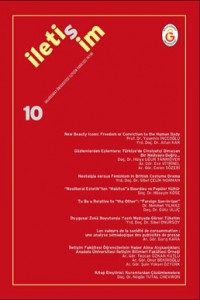Abstract
This essay examines the phenomenon of (mainly British) costume drama during the last twenty-five years and the theoretical debate surrounding the socalled 'heritage' film. Critics of the 1980s and 1990s saw in the heritage film an attempt to exploit the nostalgic and conservative appeal of the historical costume drama in order to support the Thatcherite political project of redefining and reorientating national identity. Yet the costume drama, with its independently-minded heroines and its sharp perceptions of hypocrisy and bigotry, has continued to exert an appeal for feminists, and there has also been consistent critical appreciation of its cinematic qualities in terms of mise-enscène and performative art. The critical debate between those seeing in costume drama an insidious and regressive ideological project and those who applaud the aesthetic and thematic qualities of the films involved has tended to obscure the social radicalism inherent in the original literary sources and the degree to which it has found expression in the films. A re-examination of 'classic' heritage films of the 1980s and 1990s, together with an analysis of more recent developments in the genre, indicate the presence of more subtle critical dimensions than may at first appear. The implications have a bearing on the role of cinema in forging national identity, developments in the feminist discourse and aspects of genre criticism.
Keywords
Abstract
Cet essai examine le phénomène des drames en costumes (uniquement britannique) au cours des vingt-cinq dernières années et le débat théorique entourant les soi-disant films d'héritage. Les critiques des années 1980 et 1990 ont vu dans le film d'héritage un essai d'exploiter l'attrait nostalgique et conservateur des drames en costumes historiques, afin de soutenir le projet politique thatchérien de la réorientation et la redéfinition de l'identité nationale. Cependant, le costume drama, avec ses héroïnes indépendantes et sa forte perception de l'hypocrisie et l'intolérance, a continué d'exercer un attrait pour les féministes, et il y avait une appréciation critique cohérente de ses qualités cinématographiques de mise-en-scène et l'art performatif. Le débat critique entre les gens qui voient le costume drama comme un insidieux et régressif projet idéologique et ceux qui applaudissent la qualité esthétique et narrative de ces films a eu tendance à masquer le radicalisme social inhérent à l'origine des sources littéraires et la mesure dans laquelle elle a trouvé son expression dans les films. Un réexamen des "classiques" des films d'héritage des années 1980 et 1990, avec une analyse des plus récents développements dans le genre, indique la présence des plus subtiles dimensions critiques qui échappent au premier regard. Les résultats de l'analyse sont directement liés au rôle du cinéma dans l'établissement de l'identité nationale, à l'évolution dans le discours féministe et aux différents aspects de la critique du genre.
Abstract
Bu makale son yirmi beş yılda yapılmış örnekler üzerinden kostüm drama (daha çok İngiliz) olgusunu ve "dönem" filmi olarak adlandırılan filmler üzerine olan kuramsal tartışmayı incelemektedir. 1980'lerin ve 1990'ların eleştirmenleri, söz konusu dönem filmlerinin, ulusal kimliğin yeniden tanımlanıp yön verilmesi ile ilgili Thatcher yandaşı politik projeyi desteklemek adına tarihsel kostüm filmlerinin nostaljik ve muhafazakar çekiciliğini istismar etme yolundaki girişimlerini farketmişlerdi. Buna rağmen, kostüm dramaları, özgür-bilinçli kadın kahramanlarıyla ve ikiyüzlülükle ve yobazlıkla ilgili keskin gözlemleriyle, feministler için ilgi çekici olmaya devam etmiştir, ve bu filmlerin mizansen ve oyunculuk sanatı alanındaki sinemasal özellikleriyle ilgili de sürekli olarak beğeni içeren eleştiriler ortaya konmuştur. Kostüm dramalarında sinsi ve gerici bir ideolojik projenin izlerini görenlerle, söz konusu filmleri estetik ve anlatım özellikleri açısından beğenenler arasındaki eleştirel tartışma, özgün edebi kaynakların içinde mevcut olan sosyal köktenciliğin ve bunun filmlerde ne derece ifade bulduğu konularının gözden kaçırılmasına neden olmuştur. 1980'lerin ve 1990'ların "klasik" dönem filmlerinin, bu tür filmlerde meydana gelen en son gelişmelerle beraber yeniden incelenmesi, ilk bakışta görünebilenden çok daha incelikli eleştirel boyutların varlığını ortaya koymuştur. İnceleme sonucunda elde edilen çıkarımlar, ulusal kimliğin oluşturulmasında sinemanın rolü, feminist söylemdeki gelişmeler ve tür eleştirisinin farklı yönleriyle doğrudan ilişkilidir.
Keywords
Details
| Primary Language | Turkish |
|---|---|
| Authors | |
| Publication Date | June 1, 2009 |
| Published in Issue | Year 2009 Issue: 10 |



